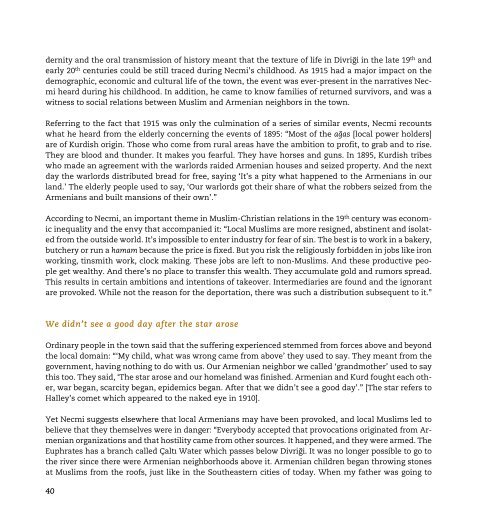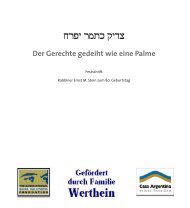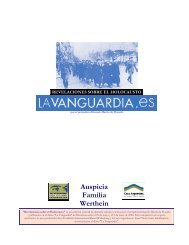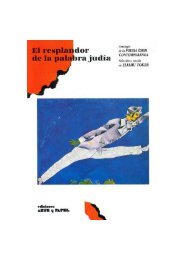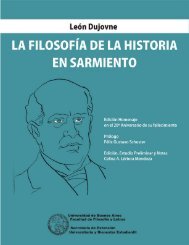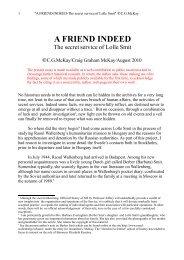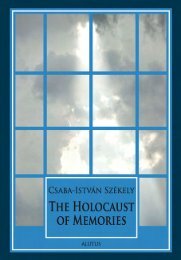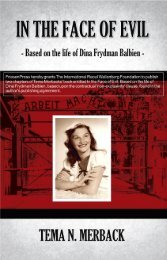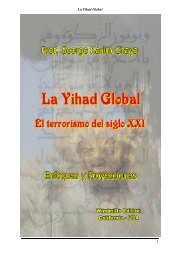Speaking to One Another - The International Raoul Wallenberg ...
Speaking to One Another - The International Raoul Wallenberg ...
Speaking to One Another - The International Raoul Wallenberg ...
- No tags were found...
Create successful ePaper yourself
Turn your PDF publications into a flip-book with our unique Google optimized e-Paper software.
dernity and the oral transmission of his<strong>to</strong>ry meant that the texture of life in Divriği in the late 19 th andearly 20 th centuries could be still traced during Necmi’s childhood. As 1915 had a major impact on thedemographic, economic and cultural life of the <strong>to</strong>wn, the event was ever-present in the narratives Necmiheard during his childhood. In addition, he came <strong>to</strong> know families of returned survivors, and was awitness <strong>to</strong> social relations between Muslim and Armenian neighbors in the <strong>to</strong>wn.Referring <strong>to</strong> the fact that 1915 was only the culmination of a series of similar events, Necmi recountswhat he heard from the elderly concerning the events of 1895: “Most of the ağas [local power holders]are of Kurdish origin. Those who come from rural areas have the ambition <strong>to</strong> profit, <strong>to</strong> grab and <strong>to</strong> rise.<strong>The</strong>y are blood and thunder. It makes you fearful. <strong>The</strong>y have horses and guns. In 1895, Kurdish tribeswho made an agreement with the warlords raided Armenian houses and seized property. And the nextday the warlords distributed bread for free, saying ‘It’s a pity what happened <strong>to</strong> the Armenians in ourland.’ <strong>The</strong> elderly people used <strong>to</strong> say, ‘Our warlords got their share of what the robbers seized from theArmenians and built mansions of their own’.”According <strong>to</strong> Necmi, an important theme in Muslim-Christian relations in the 19 th century was economicinequality and the envy that accompanied it: “Local Muslims are more resigned, abstinent and isolatedfrom the outside world. It’s impossible <strong>to</strong> enter industry for fear of sin. <strong>The</strong> best is <strong>to</strong> work in a bakery,butchery or run a hamam because the price is fixed. But you risk the religiously forbidden in jobs like ironworking, tinsmith work, clock making. <strong>The</strong>se jobs are left <strong>to</strong> non-Muslims. And these productive peopleget wealthy. And there’s no place <strong>to</strong> transfer this wealth. <strong>The</strong>y accumulate gold and rumors spread.This results in certain ambitions and intentions of takeover. Intermediaries are found and the ignorantare provoked. While not the reason for the deportation, there was such a distribution subsequent <strong>to</strong> it.”We didn’t see a good day after the star aroseOrdinary people in the <strong>to</strong>wn said that the suffering experienced stemmed from forces above and beyondthe local domain: “‘My child, what was wrong came from above’ they used <strong>to</strong> say. <strong>The</strong>y meant from thegovernment, having nothing <strong>to</strong> do with us. Our Armenian neighbor we called ‘grandmother’ used <strong>to</strong> saythis <strong>to</strong>o. <strong>The</strong>y said, ‘<strong>The</strong> star arose and our homeland was finished. Armenian and Kurd fought each other,war began, scarcity began, epidemics began. After that we didn’t see a good day’.” [<strong>The</strong> star refers <strong>to</strong>Halley’s comet which appeared <strong>to</strong> the naked eye in 1910].Yet Necmi suggests elsewhere that local Armenians may have been provoked, and local Muslims led <strong>to</strong>believe that they themselves were in danger: “Everybody accepted that provocations originated from Armenianorganizations and that hostility came from other sources. It happened, and they were armed. <strong>The</strong>Euphrates has a branch called Çaltı Water which passes below Divriği. It was no longer possible <strong>to</strong> go <strong>to</strong>the river since there were Armenian neighborhoods above it. Armenian children began throwing s<strong>to</strong>nesat Muslims from the roofs, just like in the Southeastern cities of <strong>to</strong>day. When my father was going <strong>to</strong>40


